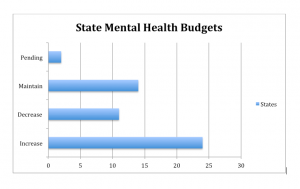Utah residents gathered at the Capitol to rally for mental health and addiction recovery Tuesday—raising posters that said, “We are worth it!,” “Mental Health Matters,” “Drug Court Saves Families,” and “#Iamstigmafree”.

The hosts, Utah Support Advocates or Recovery Awareness and the National Alliance on Mental Illness aimed to create awareness, promote recovery, and push for change in legislation regarding mental health and addiction recovery.
Families and friends walked around the Capitol, commemorating the lives they have lost to drug overdose, depression, and more. Legislators and other speakers joined them as residents filed into the Rotunda, leaving only some standing room.
The large crowd cheered and raised their posters intermittently throughout the rally.

According to Utah’s National Association of Mental Illness publication of State Mental Health Legislation 2015, Utah’s State Mental Health Authority Budgets saw increases in 2013 and 2014 and a maintenance of that budget in 2015.
This year, legislators are pushing for bills and funding that will improve funding and treatment for mental health and addiction recovery.
Rep. Steve Eliason, R-Sandy, spoke about three of his bills that will affect those with mental health and addiction.
His bill, HB240, would allow a overdose-reversal drug such Naloxone Hydrochloride “to be dispensed from pharmacies.” Daily Med indicates that Naloxone Hydrochloride is “for the complete or partial reversal of opioid depression, including respiratory depression.”

He also spoke of his bills HB308 and HB265. HB308, Disease Prevention and Substance Abuse, would authorize syringe exchange programs that would advise recipients on how to receive treatment. As Eliason said, entities in the program would tell drug users, “Let me tell you about treatment options.”
HB265 would help increase the percentage of psychiatrists in Utah by offering state income tax credits to mental health practitioners under certain circumstances which can be found on the bill’s webpage.
Eliason challenged the crowd to register to vote, to attend caucus meetings, and to write their legislators in support of these changes.
Rep. Carol Spackman Moss, R-Salt Lake City, also spoke about two of her bills. HCR4, urges Utah’s departments of health, human services, and public safety to recognize this public health crisis and direct resources to reduce the number of overdose deaths in Utah.
HB238 would make it easier for outreach providers like the host,Utah Support Advocates or Recovery Awareness , to obtain overdose-reversal drugs like Naloxone Hydrochloride as mentioned earlier.
Legislators such as Rep. Eric Hutchings, R-Kearns, and Rep. Paul Ray, R-Clearfield, were cheered on as they spoke about their support for these changes and for the improvement of the community.
Jamie Justice, executive director ofNational Association of Mental Illness Utah told the crowd of her personal experience with mental illness and recovery. She said that she comes to the legislature every day to try to make a difference. She celebrates daily that she is alive.
“You are all going to change the policies that really matter here in this legislature,” Justice said.
Current addicts attended who are recovering and are in treatment right now. Maggie Edlen, from Roy has a son and a daughter that are not in recovery.
“I support the cause,” Edlen said. “There’s got to be change, so hopefully this will open some eyes and some ears.”
Maggie came with her husband, Steve who said that addiction is “an equal opportunity destroyer.”
“It takes intelligent people and destroys their lives,” He said. “People have in their minds what an addict is and most people are wrong about that.”




